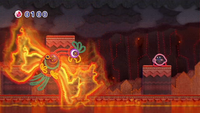Hot Wings (theme): Difference between revisions
ShadowKirby (talk | contribs) (Piquant is really the best word I can find for this piece. Thanks to Gigi for helping me sort out the meter! Will add further details if I ever discover them) |
ShadowKirby (talk | contribs) m (→Composition: don't ask why I'm remembering now) |
||
| (One intermediate revision by one other user not shown) | |||
| Line 11: | Line 11: | ||
==Composition== | ==Composition== | ||
[[File:Kirby's Epic Yarn 2010 E3 Hot Wings Battle.png|thumb|left|200px|Kirby finds the fiery Hot Wings.]] | [[File:Kirby's Epic Yarn 2010 E3 Hot Wings Battle.png|thumb|left|200px|Kirby finds the fiery Hot Wings.]] | ||
"Hot Wings" is a piquant theme in G | "Hot Wings" is a piquant theme in G Dorian mode with a mixed meter. The intro starts with a low G ostinato from brass and piano, and has abrupt chords. The piano and xylophone's diatonic melody revolving around a D comes in at 9/4 and plays twice with minor variations. More abrupt and dramatic chords follow up in 6/4 with a grace note leading from D to E, and harp passages in between. The 9/4 section repeats with a reed instrument now in the lead, followed once more by the chords in 6/4. The brass then plays a syncopated bridge with distant, sharp harmonies, as the strings hold an A, creating many dissonances. A virtuosic descending piano passage and final abrupt chord conclude the piece, which then repeats the 6/4 chord section and loops from the first 9/4 section. | ||
{{clear}} | {{clear}} | ||
Latest revision as of 16:28, 1 March 2024
| ||||||||||||
|
| ||||||||||||
"Hot Wings", named "Hot Wings's[sic] Theme" in the British English version, is a theme from Kirby's Epic Yarn and Kirby's Extra Epic Yarn associated with the boss with the same name. It was composed by Tomoya Tomita.[1]
Composition[edit]
"Hot Wings" is a piquant theme in G Dorian mode with a mixed meter. The intro starts with a low G ostinato from brass and piano, and has abrupt chords. The piano and xylophone's diatonic melody revolving around a D comes in at 9/4 and plays twice with minor variations. More abrupt and dramatic chords follow up in 6/4 with a grace note leading from D to E, and harp passages in between. The 9/4 section repeats with a reed instrument now in the lead, followed once more by the chords in 6/4. The brass then plays a syncopated bridge with distant, sharp harmonies, as the strings hold an A, creating many dissonances. A virtuosic descending piano passage and final abrupt chord conclude the piece, which then repeats the 6/4 chord section and loops from the first 9/4 section.
Names in other languages[edit]
| Language | Name | Meaning |
|---|---|---|
| Japanese | フェニクロウ Fenikurō |
From「フェニックス」(fenikkusu, phoenix) and possibly「~九郎」(-kurō, an old-fashioned given name suffix) |
| French | Flamenko | Respelling of "flamenco" (flamenco), also being a pun on "flamme" (flame) |
| German | Flanellphönix | Flannel phoenix |
| Italian | Flamenko | Same as the French and Latin American Spanish names |
| Korean | 피닉 Pinik |
Shortened form of "피닉스" (pinikseu, phoenix) |
| Latin American Spanish | Flamenko | Same as the French and Italian names |
| European Spanish | Alas Ígneas | Igneous Wings |
References
| ||||||||||||||
